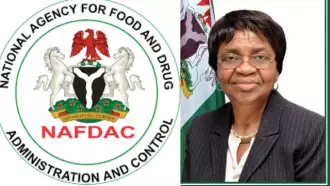
NAFDAC ASSURES CITIZENS ZERO TOLERANCE TO UNWHOLESOME CHEMICALS
Amid concerns about the influx of toxic pesticides into Nigeria, the National Agency for Food and Drug Administration and Control, NAFDAC, has assured citizens of its zero tolerance for using unwholesome chemicals.
The assurance is coming on the heels of an investigation conducted by the Heinrich Boll Foundation and published by the International Center for Investigative Reporting, ICIR, which revealed that some hazardous pesticides banned in Europe are being used in Nigeria despite attempts by NAFDAC to clamp down on the importation of harmful chemicals into the country.
NAFDAC’s Director of Chemical Evaluation and Research, Dr. Leonard Omakpariola, gave the promise during an anti-corruption radio programme, Public Conscience, produced by PRIMORG, Wednesday in Abuja.
According to Omakpariola, the agency had made painstaking and rigorous efforts to ensure hazardous chemicals or pesticides didn’t get into the Nigerian agricultural space, stressing that “NAFDAC does not register banned pesticides.”
Speaking on modalities and processes pesticides are subjected to before being certified for use, Omakpariola said: “NAFDAC as an agency is an international agency. We use best international practices in all our operations.
MDAs, the British Food and Drug Authority, the Indian Food and Drug Authority and many others train our officers. Coming to pesticide registration issues, we have our processes for registering pesticides. Whatever pesticide wishes to be registered, we first have to ensure it is not hazardous.
“Before a pesticide is registered, the Federal Ministry of Agriculture must come in, and they must do what is referred to as a field trial in conjunction with research institutions, and after they are done, we commence the registration process. If the pesticides are produced here in Nigeria, we carry out inspections, we review all their documents, analyze submitted samples in our laboratories – that’s what we do,” Omakpariola explained.
He, however, faulted the European Union, EU, for slamming ban on some pesticides, noting that most of the actions by Western countries were based on economic reasons
On his part, the Programme Coordinator of the Sustainable Nigeria Programme, Heinrich Boll Foundation, Donald Ikenna Ofoegbu, called on the Federal Ministry of Agriculture to rise to the occasion in the fight against the influx of harmful pesticides in the country.
Ofoegbu urged the Ministry of Agriculture to sensitize farmers on the risk associated with using pesticides while pointing out that “despite a lot of budget allocation going in favour of conventional pesticides, there is the issue of standard, a lot of adulteration, no tracking, no monitoring of qualities of chemicals that come into the country.”
NAFDAC is trying their best regarding registration regulation, NESREA is doing their best in the environmental side, but the middle where the chemicals are being used is a big problem. It’s a big Lacuna; so, the Ministry of Agriculture needs to wake up and see how they bridge the gap on how pesticides are used in farms.
He warned that the use of harmful pesticides in the country exposes the citizens to serious health dangers besides the economic loss, noting that a long list of Nigerian cash crops was being rejected globally due to their high pesticide residues
“Our common beans, which is highly exported, are rejected. We have sesame, cocoa, cassava; there is a long list of them, even yam – all because of pesticide residue,” Ofoegbu stated.
Towing the same line, Prof. Simon Irtwange urged NAFDAC to work with related agencies to better regulate the use of pesticides in the country, warning that Nigerians are at risk of getting sick more frequently if they continued consuming foods with high pesticide residues.
He noted that “there’s no law in Nigeria at the moment regulating the use of pesticides,” adding that it was also abnormal that NAFDAC, as the agency that regulates agro-based pesticides, does not have a single agronomist in their ranks.
I expect NAFDAC to work together with every other person and agency in that space and see how we (Nigeria) can regulate pesticides for the health of our people,” Irtwange.
Public Conscience
The programme has the support of MacArthur Foundation.




